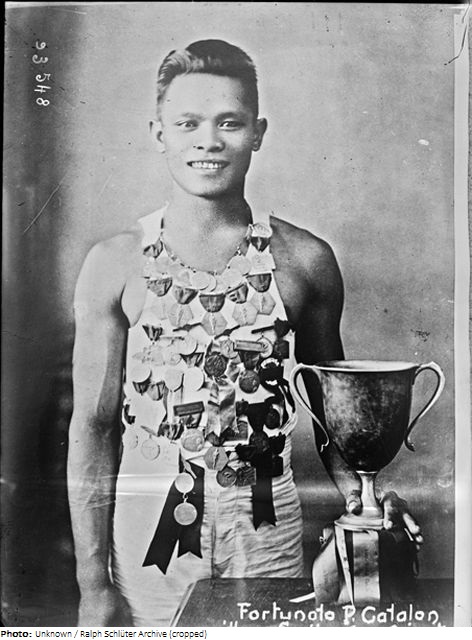
| Roles | Non-starter |
|---|---|
| Sex | Male |
| Full name | Fortunato Peliño•Catalon |
| Used name | Fortunato•Catalon |
| Born | 14 October 1897 in Tolosa, Leyte (PHI) |
| Died | 2 July 1977 (aged 79 years 8 months 19 days) in Tolosa, Leyte (PHI) |
| NOC |  Philippines Philippines |
Born into a farmers’ family from the island of Leyte, Fortunato Catalon started playing baseball in high school. When his extraordinary speed had been noticed, he switched to sprinting and proved to be a particularly quick starter. Later, Catalon studied at the University of Santo Tomas in Manila from where he graduated in 1922. His first international success came in 1917, when he won the double (100 y and 220 y) at the Far Eastern Games in Tokyo, running 10 seconds flat in the 100 y for a new championship record. Catalon repeated this feat three times at the 1919-23 Far Eastern Games. In the 1923 edition, he improved the championship record to 22.2 in the 220 y. With a personal best of 9.8 seconds over the 100 y, Catalon was ranked sixth in the world in the same year.
Elwood Brown, American leader of the Philippine Amateur Athletic Association and one of the initiators of the Far Eastern Games, arranged for the first participation of the Philippines in the 1924 Paris Olympics. Catalon was entered in the 100 and 200 m events, but eventually only fellow countryman David Nepomuceno represented the country in Paris after his victory in the local trials. After the distances were changed from yards to meters at the Far Eastern Games, Catalon continued his winning streak in the 100 m in 1925. His only defeat in individual events at five Far Eastern Games came in the 200 m when he was beaten by Nepomuceno. Nevertheless, with nine individual titles, Catalon was the most successful track and field athlete in the history of the Far Eastern Games adding additional gold medals in the 4 x 220 y relay with the Filipino team.
Catalon started the 100 m finals at the last Far Eastern Games in 1934 as well as in the 1954 Asian Games, both held in Manila. He is candidate for induction into the projected Philippine Sports Hall of Fame. Catalon was immortalized, acting as the model for the iconic Glico Man in Osaka’s entertainment district, advertising Glico candies.
After retiring from active sports, he became a coach and official.
| Games | Discipline (Sport) / Event | NOC / Team | Pos | Medal | As | |
|---|---|---|---|---|---|---|
| 1924 Summer Olympics | Athletics |  PHI PHI |
Fortunato Catalon | |||
| 100 metres, Men (Olympic) | ||||||
| 200 metres, Men (Olympic) |